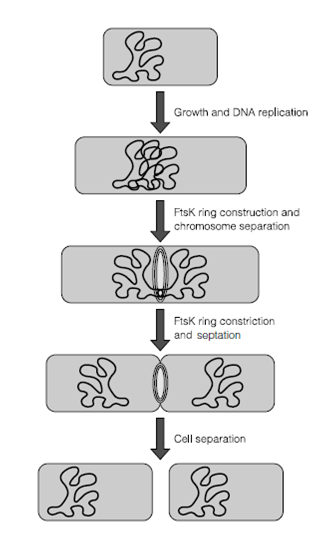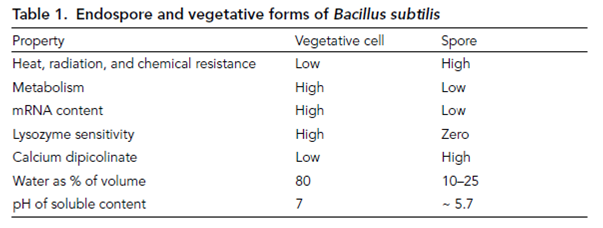Binary fission
Most Archaea and Bacteria cells accumulate biomass until a critical volume is reached when they seperated into two identical daughter cells. This division occurs in a single plane of symmetry. To some extent division dictates the simplicity in cell shape and the prevalence of cell numbers of 2n when cells appear in clusters or chains. The procedure of cell division is outlined in Figure 1 and can be divided into four steps that are
(1)Growth and replication
(2) FtsK ring construction and chromosome separation
(3) FtsK ring constriction and septation
(4) and lastly cell separation.
The procedure is poorly understood involving several proteins and an extremely efficient control system. A middle role is played by FtsK a functional and structural analog of the eukaryotic tubulins. The FtsK was named after the filamentous temperature-sensitive mutants which were first recognized in E. coli. At some

Figure 1: Bacterial cell division
temperatures mutants were unable to septate and became long multinucleate filaments a phenomenon seen in some wild-type lactobacilli and in Streptomyces.During the procedure of chromosomal replication FtsK monomers start to move to a point midway among the two ends of the cell. It is unclear how this happens but inhibitors have been identified at the poles preventing the initiation of unwanted separation. The FtsK proteins form a ring and it is certain that at this point other proteins are recruited to the locality to deal with the site-specific recombination events which must take place to allow the separation of the two replicated chromosomes. The formation of a septum starts with constriction of the FtsK ring across the width of the cell and the septum forms completely so in which the daughter cell becomes separate in Figure 1. There are undoubtedly several other mechanisms governing the act of cell division since the entire contents of the cell membrane, cell including, proteins, ribosomes, lip- ids , cell wall and any extra-chromosomal material must also be divided among the two cells as both daughter cells are immediately and fully functional. It is remarkable which this process is repeated every 40 minutes through E. coli. The universality of FtsK-like proteins across both the Archaea and Bacteria suggests in which this is an evolutionarily conserved fundamental mechanism for single-celled life.
